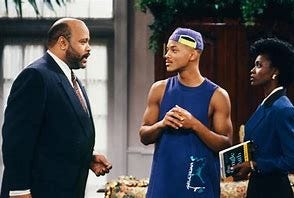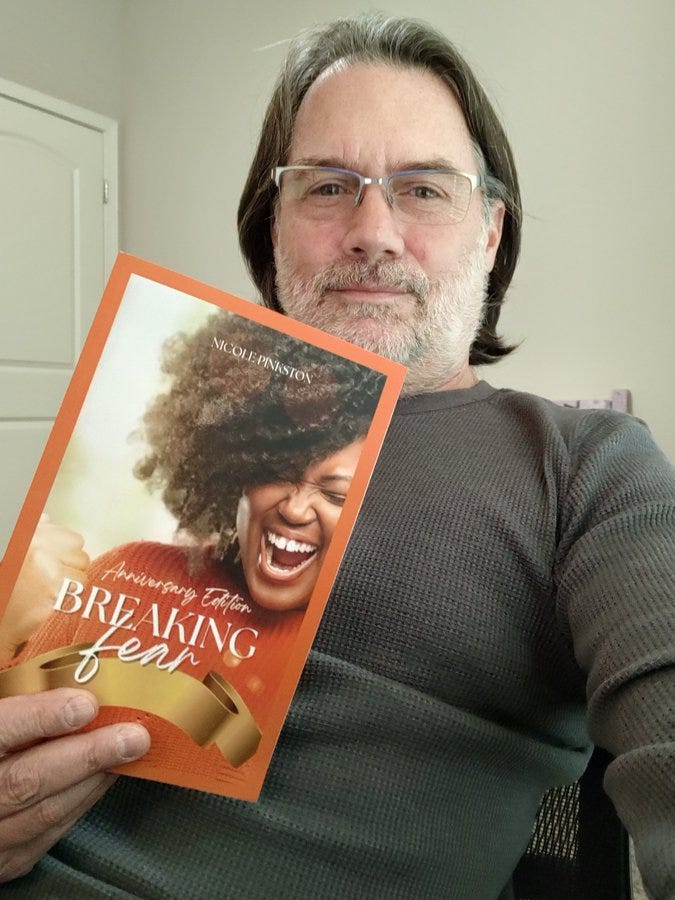How I Help Strengthening the Fabric of Society with Positive Fatherhood Content
What if we used the power of our media to represent good fathers?
Good Thursday morning, Icons,
Thank you so much for joining our newsletter.
Iconic is the number one hub for marriage success and empowerment. Our vision is to restore, revitalize, and reignite the institution of marriage by empowering you to build thriving social empires.
This newsletter is that mission as our mission is to create thousands of marriages and save many more through our online and offline resource. You help us do that with your comments, sharing our newsletters, funding our work, prayers and support.
We pray that you have an amazing start to this new week in life, love, marriage and family.
August is Back to school month, and we are tying that around our parenting series just for you.
Remember, Iconic is a community. Please leave a like, share and comment so we can continue the conversation down in the comments.
How I Help Strengthening the Fabric of Society with Using Positive Fatherhood Content
One of the many ways I help strengthen parenthood with Iconic is through positive portrayals of fathers. Every June, we celebrate real-life dads and show that many fathers are doing the work in America to raise healthy families and children. Despite the constant talking about deadbeats, real fathers are doing the work each and every day.
Today, I wanted to revisit some of the positive media images of dads out there that can make us all hopeful about the future of parenting.
The Impact of Positive Fatherhood in Media
Positive representations of fatherhood in media serve as powerful catalysts for social change.
By showcasing fathers who are engaged, compassionate, and nurturing, media can inspire men to embrace these qualities in their own lives.
Countering Negative Stereotypes
For too long, fathers have been depicted as either bumbling, inept figures or hyper-masculine heroes.
By promoting stronger dad content, we can counter these negative stereotypes and highlight the true competence and care that fathers bring to parenting.
The Role of Media in Fatherhood
Media has the power to influence public perception and reinforce the importance of fatherhood.
Positive media representation can support men who choose to be actively involved in their children’s upbringing, reflecting the dynamic nature of parental roles5. It can also combat prejudices and biases, particularly for Black fathers, whose portrayal often suffers from negative stereotypes6.
A Call to Action
We urge content creators, broadcasters, and influencers to prioritize and amplify positive fatherhood content. Let us celebrate the diverse experiences of fatherhood and the profound impact engaged dads have on our society. Together, we can foster a culture that values and supports strong father-child relationships, laying the groundwork for a brighter, more inclusive future.
Breaking Fear
Our fifth book, "Breaking Fear," delves into my personal experience with miscarriage and the fear that accompanied it. Join me on this journey and discover how to conquer your deepest fears and triumph. Upgrade your Iconic subscription to paid and receive this inspiring story directly in your inbox.
Positive Father Roles on Screen
Positive dad content in media comes in various forms, showcasing fathers who are nurturing, supportive, and actively involved in their children’s lives. Here are some notable examples:
The Pursuit of Happyness - Will Smith portrays Chris Gardner, a single father who, despite facing severe hardships, remains determined to provide for his son and exemplifies resilience and dedication1.
Eighth Grade - Features a compassionate father who supports his daughter through her challenging teenage years, providing a model of understanding and emotional availability1.
Glee - The character Burt Hummel, a blue-collar, single dad, gives his teenage son one of the most heartfelt and supportive talks on screen, reflecting the power of positive fatherhood portrayal1.
Call Me By Your Name - Showcases a father who provides unwavering support and understanding to his son during a pivotal moment in his life1.
Black Lightning - Jefferson Pierce is not only a superhero but also a school administrator and father who demonstrates love and integrity in every aspect of his life2.
Brands Campaigns - General Mills Canada’s #HowToDad and Toyota’s “One Bold Choice Leads to Another” campaign both promote images of competent, nurturing, and emotionally healthy fathers3.
Television Shows - Shows like “Black-ish” and films like “Fences” offer nuanced and genuine depictions of black fatherhood, breaking free from stereotypes and highlighting the roles of provider, protector, nurturer, and mentor4.
These examples reflect a shift towards more realistic and positive portrayals of fatherhood, which can inspire and encourage fathers in their important role within the family and society.
Who was your favorite TV father? Upgrade your account to Iconic+ to leave us a comment.
Positive Dad Content’s Impact on Children
Positive dad content has a significant and beneficial impact on children’s development across various domains:
Social Competence: Children with supportive fathers exhibit higher levels of social competence and better peer relationships1.
Academic Performance: Frequent father-child communication and provision of learning materials are linked to better performance in school and more advanced language skills1.
Emotion Regulation: Regular positive contact with their father helps children regulate their emotions more effectively1.
Self-Regulation: Supportive co-parenting relationships involving fathers are related to better self-regulation and fewer behavior problems in children1.
Well-being: Father involvement, even when not living with the child, is important for a child’s well-being and can serve as a buffer against conflict between parents1.
Confidence and Social Connections: Fathers involved in daily care activities like feeding, bathing, and playing contribute to children’s confidence and stronger social connections2.
Health Outcomes: Positive father involvement is related to improved health outcomes in infants, such as better weight gain in preterm infants and improved breastfeeding rates3.
These findings underscore the importance of positive father figures in media, as they can influence real-life father-child interactions and contribute to the overall development and well-being of children.
Summary
The positive media portrayal of good fathers is crucial for the health of marriages and families for several reasons:
Role Modeling: Media portrayals act as role models. When fathers are depicted positively, they set a standard for real-life fathers to emulate, encouraging active and nurturing parenting1.
Shaping Perceptions: Media has the power to shape societal perceptions. Positive depictions can help to normalize involved fatherhood, which can influence policy and community support for family-friendly practices2.
Supporting Co-Parenting: Positive images of fatherhood can reinforce the importance of co-parenting, where both parents are actively involved in raising children, leading to more balanced and harmonious family dynamics2.
Countering Stereotypes: Challenging negative stereotypes about fathers, especially those from marginalized communities, can reduce prejudice and promote equality within the family structure1.
Emotional Health: Children who see positive father figures in media are more likely to develop healthy emotional bonds with their own fathers, contributing to better mental health and well-being1.
Marital Satisfaction: When fathers are portrayed as competent and caring partners, it can influence real-life expectations and behaviors, leading to greater marital satisfaction and stability2.
Community Impact: Positive portrayals can inspire community programs and initiatives that support father involvement, which can have a ripple effect on the broader social fabric1.
In essence, the way fathers are represented in media can have a profound impact on individual families and society at large, promoting healthier relationships and stronger family units. Check out our Strong Dad June content to learn about the positive content we’ve done about dads include Iconic’s own Mr. Pinky.
🌟 Become a Sponsor on Iconic - Where Families Flourish 🌟
Join us at Iconic, the premier destination for inspiring marriage and family content. Our platform celebrates the joy of family life, offering a space where positive stories and advice thrive. We invite you to be a part of our journey by choosing one of our exclusive sponsorship packages:
🌱 Seed Sponsor - $25 a month
Your brand name listed on our “Thank You” page.
A shoutout in our daily newsletter.
🌼 Blossom Sponsor - $50 a month
All benefits of the Seed Sponsor.
A featured spot in one of our weekly articles.
Social media mention across all platforms.
🌳 Evergreen Sponsor - $150 a month
All benefits of the Blossom Sponsor.
Your logo displayed prominently on our homepage.
An exclusive sponsored post tailored to your brand.
Priority placement in our sponsorship.
By sponsoring Iconic, you align your brand with values of love, commitment, and family unity. Let’s nurture these values together and watch our communities grow.
Interested in becoming a sponsor? Donate below and get started.
Our Iconic Sponsors
We extend a heartfelt blessing to our Icon sponsors for their monthly contributions and donations to our iconic endeavors. Their support enables us to provide free online newsletters from Monday to Friday, develop new digital products, and distribute free books to the public each month via Twitter.
Subscribe today to their newsletters and purchase/preorder their newest books.
Coach Felecia Killings of The Felecia Killings Foundation | Empowering rising leaders with advanced spiritual and practical training that help them manifest their God-given purpose in the social, political, and economic spheres. Order your copy of Cooking with Coach Felicia Killings and the Women of CCM.
Greg Bulla of From Where I Stand Substack | Looking at the lessons to be learned from authentic American history and how they can build better communities of individuals. Order your copy of For Their Own Good? today.
Sponsors We Say Thank You!
Jimmie Doss
Richard Garner
Greg Bulla
Felecia Killings
Michelle Murphy
Maddie
Tye







